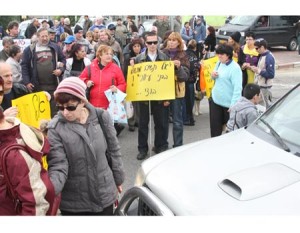“You shall not curse the deaf or place a stumbling block before the blind, you shall fear your God, I am God.” (Leviticus 19:14)
“You shall rise before the aged and show deference to the old, you shall fear your God, I am God.” (19:32).
“Do not wrong one another, but fear your God for I Adonai am your God” (25:17)
“Do not exact (from the poor) advance or accrued interest, fear your God” (25”36)
“You shall not ruthlessly rule over (the slave), fear your God” (25:43)
The cautionary words “fear your God” appears only five times in Torah, and all five are in Leviticus (19, 25); all outline obligations (mitzvoth) of relations between people, in Hebrew, ben Adam lahavero; more specifically and significantly all spell out the duties and obligations to the powerless, the marginalized, those with disabilities: the deaf, the blind (literally and in the broader sense) the elderly, the stranger, the poor and the slave.
Why does the admonition to fear God occur only five times—and why are those specific mitzvot mostly about social/human relations? The sages have noted the common thread in the warnings: “any thing that has to do with the heart (compassion) is followed by “you shall fear” (Midrash Sifre). Matters of the heart—things that human judges cannot assess whether the person acted with good or bad intention, such as misleading another, giving someone the wrong direction or advise, disrespecting, or ignoring others, are instances in which the person can claim innocence and say, “I meant well”, and the intention to harm remains hidden in the heart. Torah, recognizing the possibility of dissembling warns— “you shall fear God”—the One who knows human thoughts and intentions and judges those (Rashi.)
Rav Yehudah Hanasi said, “Know what is above you—an eye that observes, an ear that listens, and all your deeds are written down.” (Ethics of the Sages 2: Mishnah A). Maimonides comments on that, “All your deeds are known before God, as though they were written in a book.”
Don Isaac Abarbanel writes that the words “you shall fear God”, are Torah warning those with power “to refrain from oppressing the powerless,” Every person must watch out to not deceive, lie, or rob—actions taken by the strong against the weak, and the rich against their employees, and the hearing person against the deaf and the one who sees against the sightless. In those cases where transgressions are far from obvious to those who must render a judgment, when they cannot easily discern the harm done, transgressors may feel confident that their intentions are out of sight, hidden in the depth of the heart. Keeping such a possibility of deception in mind, Torah warns, “fear your God” – “not because others will see the deed for what it is, but for the fear of God, who knows the human heart and sees the ways of the world.
Rabbi Hirsh emphasizes that “fear your God” is a “warning to each one of us” so that we will know “that not a human judge will bring the case against us, yet each one of us will stand before God…whose Presence fills the world, and we have to be our own keepers, accountable for our deeds.”
In a broader perspective these five admonitions are a call, “God is calling on us in the same way that in prayer we call to God”. Just as the heart is the subject of prayer, so must the heart exercise obligations and fulfill its duties. It is incumbent on us to act with pure and honest intentions. “It is the intentions of the heart that places humans before God” (Leo Beck).

protesting closing
of an educational facility
for the blind
Kiryat Hayim Israel
It is incumbent on us to bring “God’s call to us” to our daily lives and respond to those who are in need before they feel the need to take to the streets to protest our inattention.